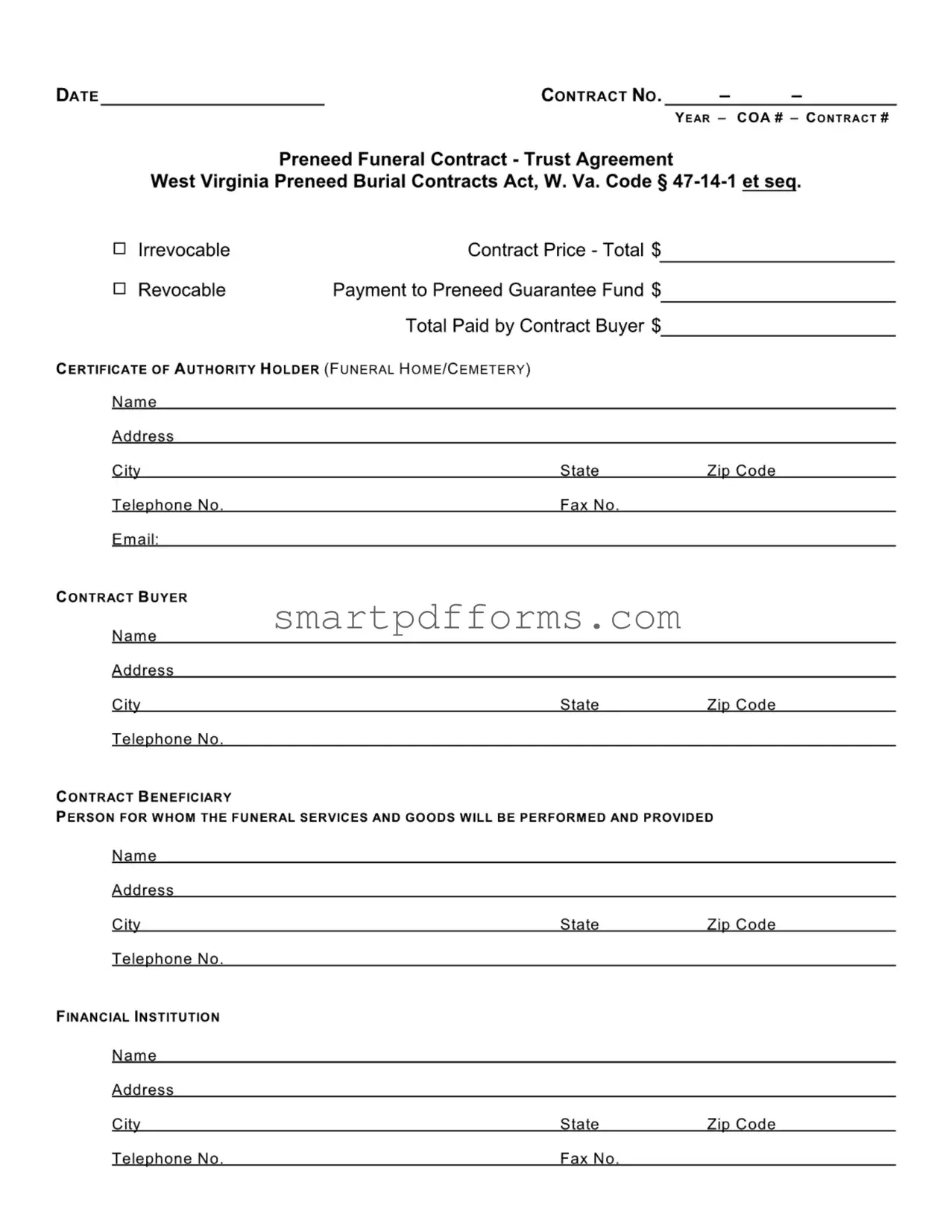Blank Funeral Contract Sample PDF Template
Planning for end-of-life arrangements can be a daunting and emotionally charged endeavor, yet the creation of a Preneed Funeral Contract serves as a practical step to ensure that one's final wishes are honored and financially prepared for. Such contracts, governed under the West Virginia Preneed Burial Contracts Act, allow individuals to prearrange and prepay for their funeral services and goods, providing peace of mind for both them and their families. A Funeral Contract Sample form outlines the detailed agreement between the contract buyer and the funeral provider, including options for both irrevocable and revocable contracts, pricing, payment plans, and the specifics of the funeral services and goods to be provided. It formalizes the arrangement by detailing how funds will be deposited into a trust account, the percentage of monies the funeral provider is permitted to retain, and a comprehensive list of guaranteed and non-guaranteed goods and services associated with the funeral. This document ensures transparency between all parties involved and guarantees that the preferences of the individual are respected and executed accordingly.
Preview - Funeral Contract Sample Form
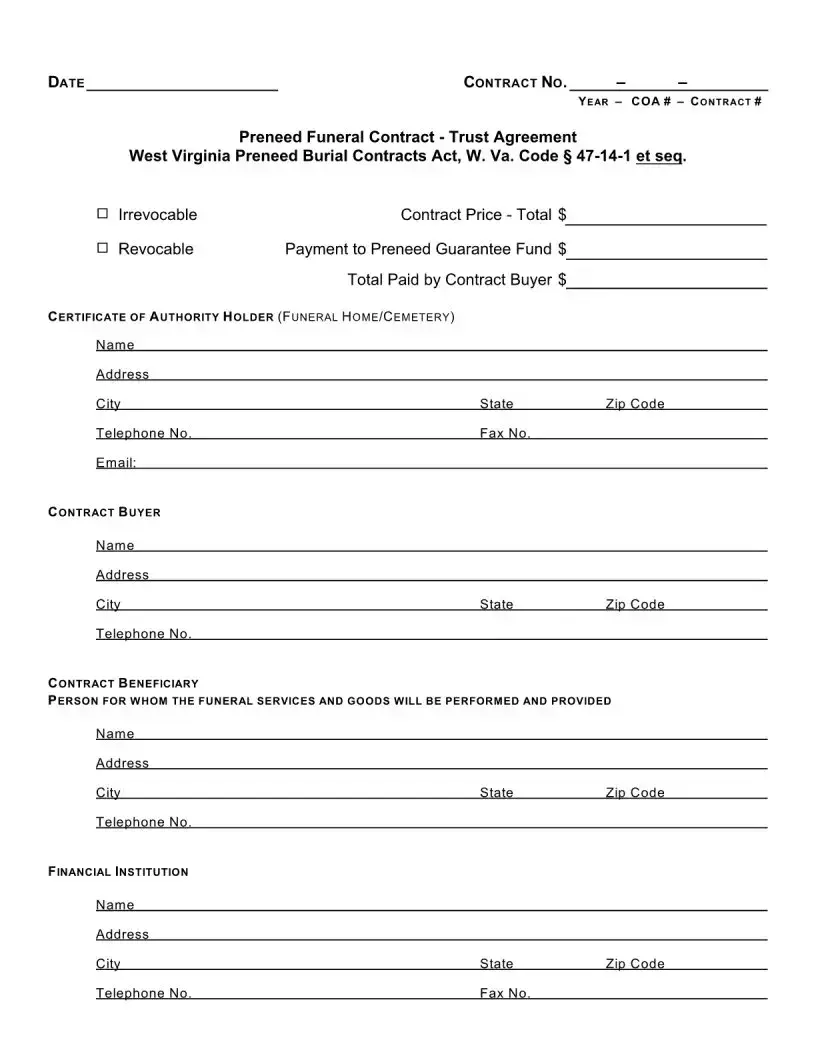
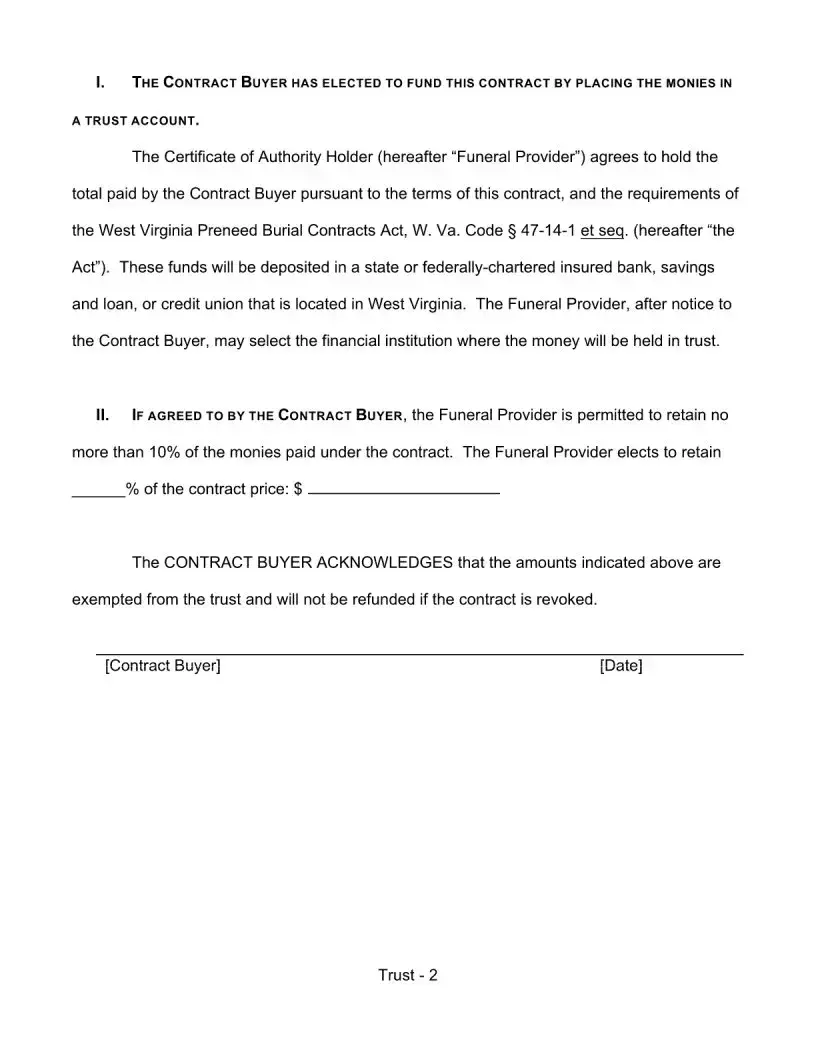
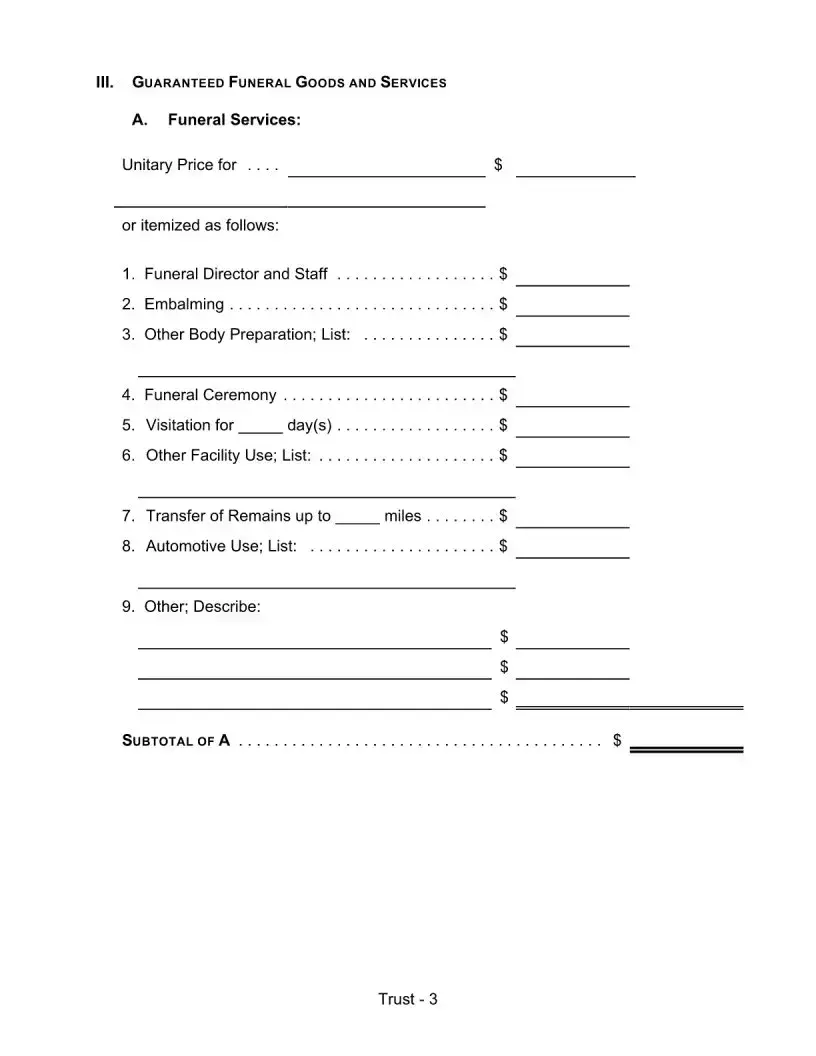
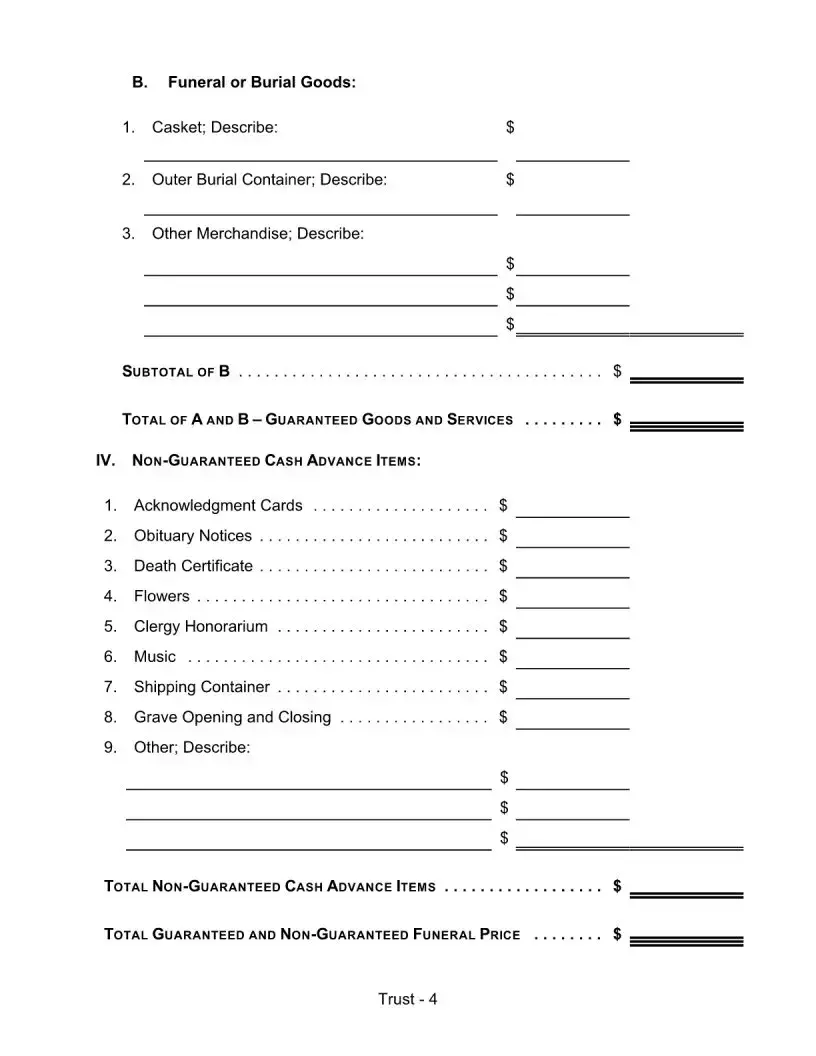
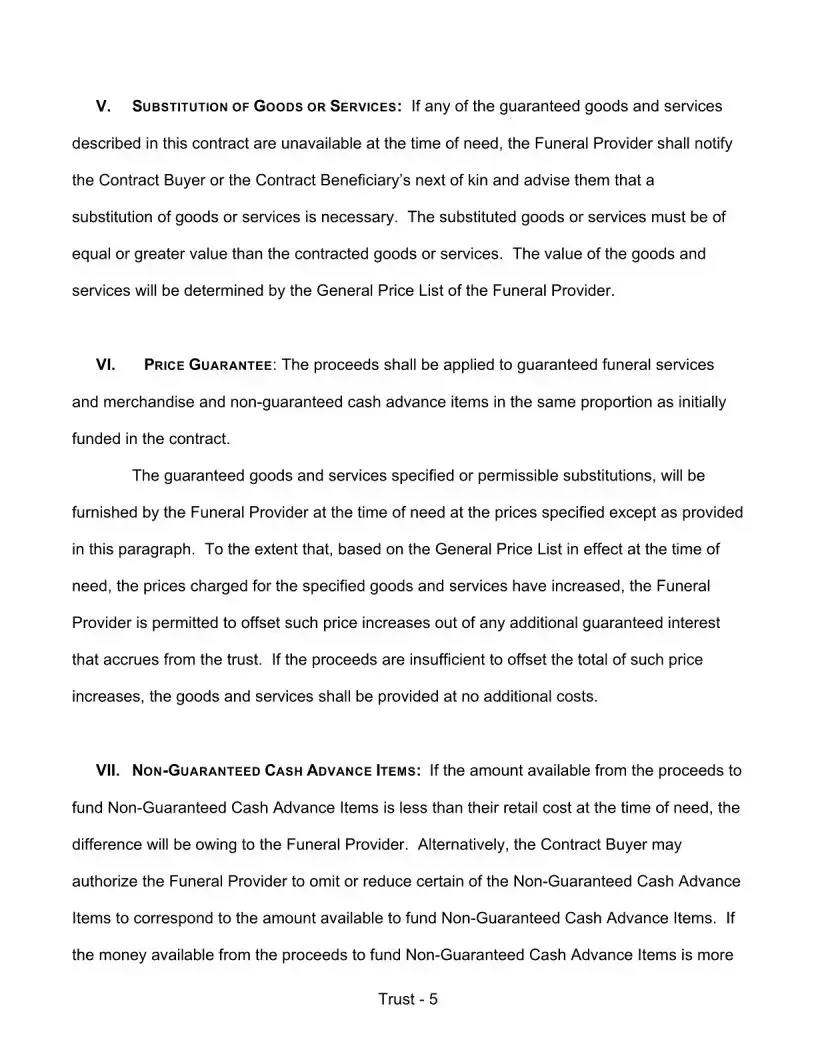
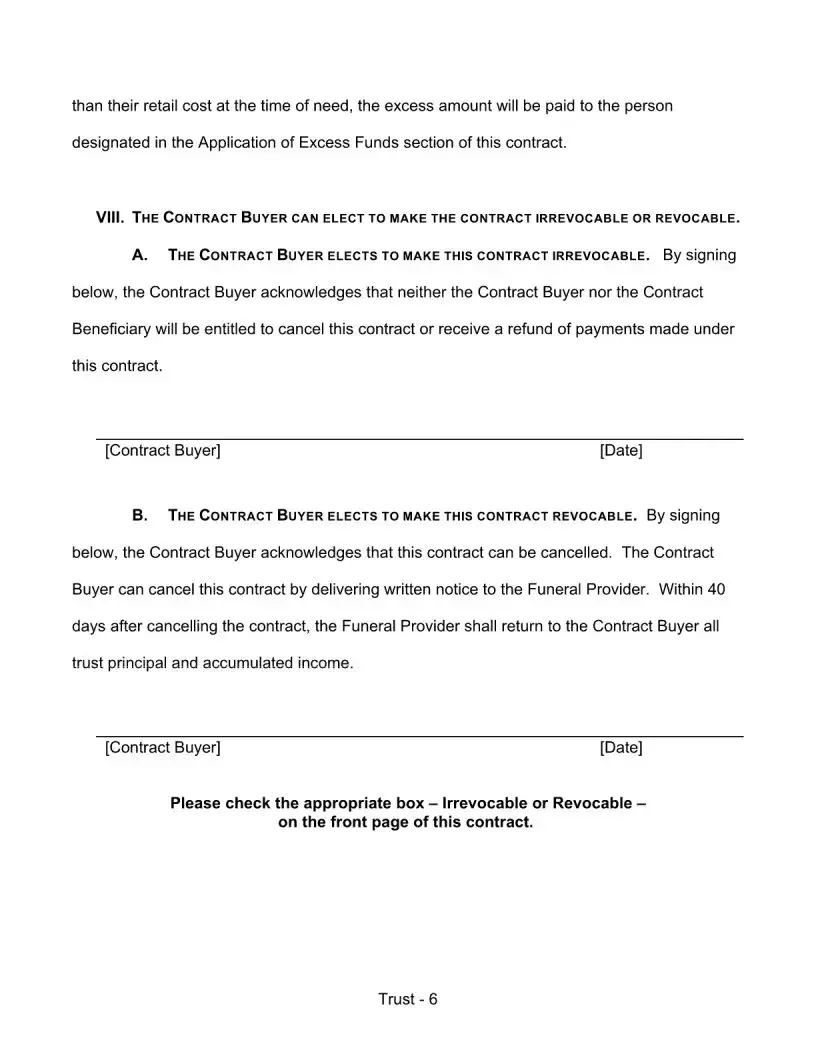
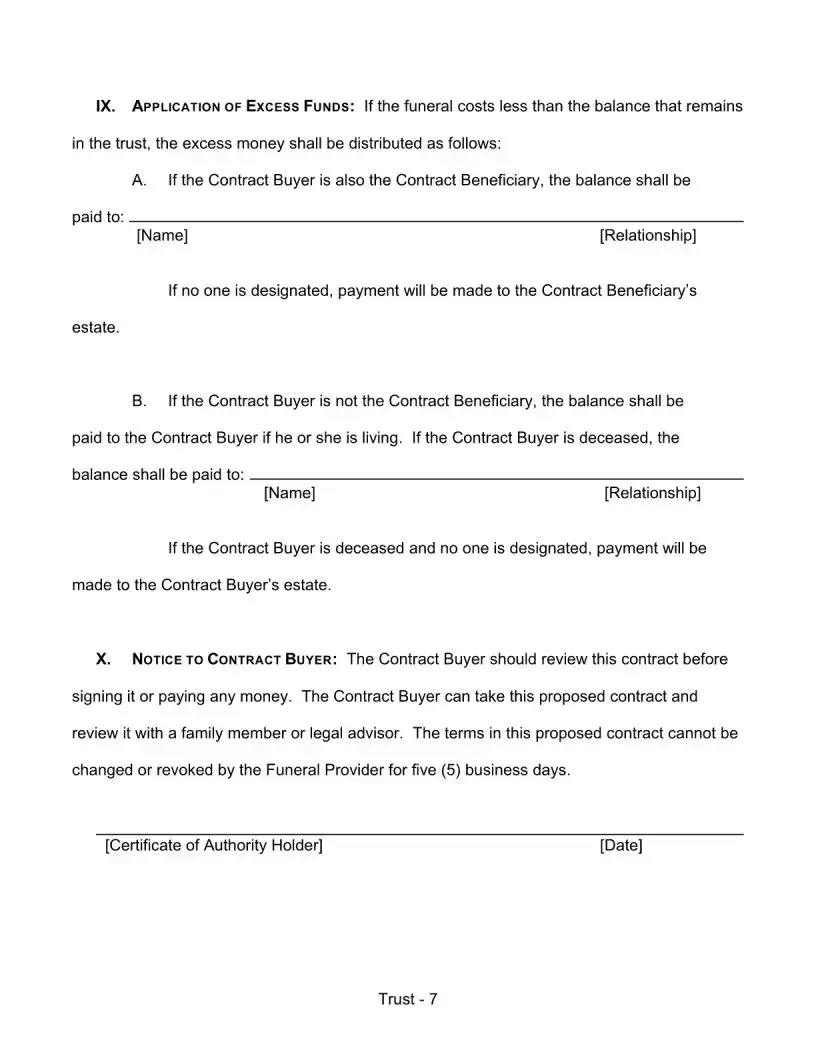
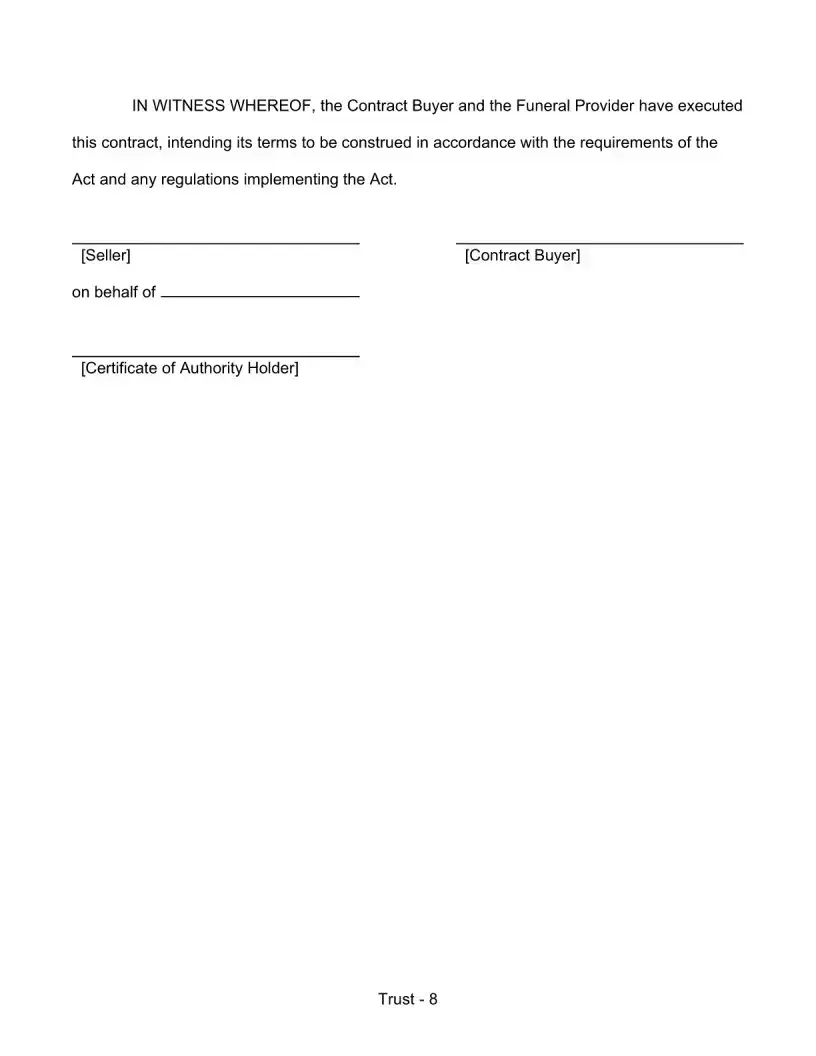
Form Data
| Fact Name | Description |
|---|---|
| Contract Overview | This is a Preneed Funeral Contract with options for both irrevocable and revocable agreements, governed by the West Virginia Preneed Burial Contracts Act. |
| Governing Law | The contract is governed by the West Virginia Preneed Burial Contracts Act, W. Va. Code § 47-14-1 et seq. |
| Funding Method | The contract is funded through a trust account, with the funds being deposited in a state or federally-chartered insured financial institution located in West Virginia. |
| Funeral Provider's Fee | The Funeral Provider can retain up to 10% of the monies paid under the contract, which is exempted from the trust and non-refundable if revoked. |
| Guaranteed Services | The contract covers various funeral goods and services, including funeral director services, embalming, ceremony, and use of facilities, among others. |
| Non-Guaranteed Items | Cash advance items like flowers, obituary notices, and death certificates are not guaranteed under the contract price. |
| Financial Institution | The selected financial institution where the funds will be held in trust is chosen by the Funeral Provider, subject to notice to the Contract Buyer. |
| Funeral Goods Details | Details about funeral or burial goods like caskets and outer burial containers are itemized, with descriptions and prices. |
| Total Contract Price | Includes the sum of all guaranteed funeral goods and services, in addition to non-guaranteed cash advance items. |
Instructions on Utilizing Funeral Contract Sample
Filling out a Funeral Contract can be an important step in pre-planning and ensuring that a loved one's final wishes are honored and financially managed in a respectful and lawful manner. This process, while dealing with sensitive subjects, provides clarity and peace of mind for all involved, ensuring that agreements are properly documented and financially secured according to the stipulations of the West Virginia Preneed Burial Contracts Act. The steps below guide you through completing a Funeral Contract Sample form, breaking down each section to make the process as straightforward as possible.
- Enter the current Date and Contract No. at the top of the form, including Year, COA#, and Contract# spaces as applicable.
- Check the appropriate box to indicate whether the contract is Irrevocable or Revocable, and fill in the Contract Price, Payment to Preneed Guarantee Fund, and Total Paid by Contract Buyer.
- Under Certificate of Authority Holder, provide the Funeral Home or Cemetery's Name, Address, City, State, Zip Code, Telephone No., Fax No. (if any), and Email.
- Fill in the Contract Buyer section with the individual's Name, Address, City, State, Zip Code, and Telephone No.
- In the Contract Beneficiary area, provide the details of the person for whom the funeral services and goods will be performed. This section requires the same information types as the Contract Buyer.
- For the Financial Institution section, input the Name, Address, City, State, and Zip Code of the institution where the contract funds will be held.
- Confirm the arrangement for funding the contract through a trust account by acknowledging the agreement terms as outlined in section I.
- Indicate the percentage of the contract price the Funeral Provider is permitted to retain, if agreed upon, and fill in the specified dollar amount in section II.
- Document the Guaranteed Funeral Goods and Services in section III, including individual items and their prices under both Funeral Services and Funeral or Burial Goods, along with any Subtotals.
- Itemize Non-Guaranteed Cash Advance Items in section IV, including prices for each item listed and the total amount for these items.
- Ensure both the Contract Buyer and the Funeral Provider sign and date the form, acknowledging and agreeing to the terms laid out within the contract.
Once completed, this form acts as a secured agreement between the Contract Buyer and the Funeral Provider, outlining the services, goods, and financial arrangements agreed upon. It's crucial to review all entered information for accuracy and completeness before signing. Additionally, retaining copies of the signed contract for personal records and for the Contract Beneficiary is advisable, ensuring that all parties have access to the contract details for future reference.
Obtain Answers on Funeral Contract Sample
What is a Preneed Funeral Contract?
A Preneed Funeral Contract is an agreement established between an individual (the Contract Buyer) and a funeral service provider (the Certificate of Authority Holder), where funeral services and goods are arranged and paid for in advance of need. This proactive approach is regulated by specific laws, in this case, the West Virginia Preneed Burial Contracts Act.
What are the differences between Irrevocable and Revocable contracts?
In an irrevocable contract, the agreement and its terms are final and cannot be altered or canceled by the contract buyer. This type is often used for Medicaid planning purposes. On the other hand, a revocable contract allows the buyer the flexibility to alter or cancel the contract and receive a refund on the funds paid, subject to certain conditions and potentially excluding any amounts exempted from the refund.
How is the money for the Preneed Funeral Contract protected?
According to the contract, the funds paid by the Contract Buyer are to be placed in a trust account. This ensures that the money is safeguarded in a state or federally-chartered and insured financial institution located in West Virginia, thereby securing the buyer's investment until the services are needed.
Can the Funeral Provider retain any portion of the funds paid?
Yes, with the agreement of the Contract Buyer, the Funeral Provider can retain up to 10% of the money paid under the contract. This retained amount is acknowledged by the Contract Buyer to be non-refundable in the case of contract revocation.
What are Guaranteed Funeral Goods and Services?
Guaranteed funeral goods and services are those outlined in the contract for which the price is locked in and will not change regardless of potential price increases in the future. This section covers all aspects of the funeral service, including the funeral director and staff, embalming, the ceremony, and all necessary goods like the casket and outer burial container.
What are Non-Guaranteed Cash Advance Items?
Non-guaranteed cash advance items refer to services and goods whose prices cannot be precisely determined at the time of the contract signing. These may include obituary notices, clergy honoraria, and flowers. The prices for these items are therefore not locked in and may vary at the time of need.
What happens to the funds if the contract is canceled?
If a revocable contract is canceled, the Contract Buyer is typically entitled to a refund, minus any amounts the contract allows the Funeral Provider to retain. However, if the contract is irrevocable, cancellation might not be an option, depending on the specific regulations and terms outlined within the contract itself.
Who can be named as the Contract Beneficiary?
The Contract Beneficiary is the individual for whom the funeral services and goods will be provided. This person can be the Contract Buyer themselves or another individual designated by the buyer.
What role does the financial institution play in this contract?
The designated financial institution, which must be located in West Virginia and adheres to state and federal regulations, is responsible for holding the funds in trust. The selection of this institution is at the discretion of the Funeral Provider, with stipulations for approval and notice to the Contract Buyer.
How is price determined for items not specified in the contract?
For items not specifically guaranteed or quantified in the contract, such as some cash advance items, the price is determined based on the rates at the time the services or goods are required. The Funeral Provider will provide these items at cost, adding them to the total amount due at the time of service.
Common mistakes
Not clarifying the nature of the contract as either irrevocable or revocable. This decision impacts the ability to alter the contract in the future, with irrevocable contracts typically not allowing for changes once they are signed. This choice has significant implications, especially regarding Medicaid eligibility and asset spend-down considerations.
Failing to thoroughly review and specify the financial institution details where the funds will be held in trust. It’s important to ensure that the institution is state or federally-chartered and insured, complying with West Virginia regulations. Incorrect or vague information can complicate the management of the trust account or affect the security of the funds.
Overlooking the percentage of monies the Funeral Provider is permitted to retain from the contract price. Not specifying or misunderstanding the agreed-upon percentage (up to 10%) can lead to discrepancies between the expectations of the contract buyer and the actual amount retained by the provider. This also influences the overall refund amount if the contract is revoked.
-
Miscalculating or not itemizing correctly the costs of funeral goods and services as well as non-guaranteed cash advance items. This includes services such as embalming, ceremony costs, and goods like the casket or outer burial container. Additionally, non-guaranteed items like obituary notices and death certificates need clear enumeration. Accurate itemization ensures that the contract accurately reflects the total expected costs and prevents future financial surprises.
- Ensuring accurate and detailed descriptions of services and goods
- Verifying the unit prices and associated quantities
- Understanding which items are guaranteed in the service package and which are additional costs
Attention to these details not only guarantees compliance with state regulations but also secures a clear and agreed-upon arrangement between the contract buyer and the funeral provider, ensuring that the final wishes of the contract beneficiary are honored respectfully and accurately.
Documents used along the form
When arranging a funeral, families and individuals must navigate through a complex process that involves not only emotional decisions but also legal and financial considerations. Beyond the Funeral Contract Sample form, which outlines the terms and services agreed upon with a funeral provider, several other documents play crucial roles in the preparation and execution of funeral arrangements. These documents ensure clarity, legal compliance, and the fulfillment of the deceased's and their family's wishes.
- Last Will and Testament: A critical document that outlines the deceased's wishes regarding the distribution of their assets and care of any dependents. It may also contain instructions about desired funeral arrangements.
- Death Certificate: Issued by a government agency, this official document confirms the death, including the date, location, and cause. It's required for various legal purposes, including claim settlements and estate distribution.
- Authorization for Cremation: If cremation is chosen, this document provides formal permission for the process. It typically needs to be signed by the next of kin or as directed by the last will.
- Obituary: While not a legal document, the obituary is often prepared alongside funeral arrangements. It publicly announces the death and details about the memorial services, serving as a tribute to the deceased.
- Preneed Guardian Form: Applicable when the deceased had made arrangements for their funeral services ahead of time, designating a guardian to ensure these wishes are carried out. This form can be part of pre-planning documents.
- Insurance Policies: Life insurance or funeral insurance policies are crucial for covering funeral expenses and providing financial support to the family. Key details from these policies will interact with funeral contract specifics.
- Transfer of Remains Authorization: If the death occurs away from the desired funeral site, this document authorizes the transportation of the body back to the local jurisdiction or funeral home.
Collectively, these documents form a comprehensive framework that supports the funeral planning process, addressing legal, financial, and personal aspects. Everyone involved, including the funeral service providers, legal representatives, and the deceased's family, must carefully consider and handle these documents to ensure a respectful and compliant farewell. Understanding each document's purpose and requirements can significantly ease the logistical and administrative burdens during a time of grief.
Similar forms
A Living Trust Agreement: Similar to the Funeral Contract Sample form, a living trust agreement involves placing assets in a trust during an individual's lifetime. Funds from the trust are then used according to the trust's terms, which could include covering funeral expenses upon the individual's death. This parallels the preneed funeral contract's approach of earmarking funds in advance for specific uses, which in both scenarios is intended to ease financial and administrative burdens on surviving family members.
Real Estate Escrow Agreement: This type of agreement, used in property transactions, ensures that money is held by a third party (the escrow agent) until certain conditions are met, similar to how the preneed funeral contract requires funds to be held in a trust account. Both documents ensure that funds are secure and properly used for their intended purpose upon fulfillment of specified conditions (e.g., the completion of a real estate transaction or the provision of funeral goods and services).
Life Insurance Policy: The primary similarity between a Funeral Contract Sample form and a life insurance policy lies in their forward-looking nature, planning for expenses associated with death. While life insurance provides a lump sum to beneficiaries or an estate, a preneed funeral contract allocates funds specifically for funeral arrangements. Both serve to relieve financial pressure during a time of grief and ensure that the deceased's wishes are honored.
Health Care Power of Attorney: Although not a financial agreement, a health care power of attorney shares a key similarity with the preneed funeral contract in terms of planning for incapacity or death. Just as a health care power of attorney designates someone to make health care decisions on behalf of the principal if they are unable to do so, a preneed funeral contract outlines specific arrangements for funeral services and goods, ensuring that the individual's preferences are respected.
Dos and Don'ts
When preparing to fill out the Funeral Contract Sample form, it's crucial to approach the process with care and attention to detail. Below are 10 important dos and don'ts that can guide you through completing the form accurately and effectively.
Dos:
- Review the entire form before starting to ensure you understand all requirements.
- Gather all necessary information, such as the full names and addresses of the contract buyer, the beneficiary, and the funeral home, before beginning.
- Clearly designate whether the contract is irrevocable or revocable, understanding the significance of each option.
- Ensure the total contract price and any payments made to the Preneed Guarantee Fund are accurately recorded.
- Carefully list all selected funeral goods and services under the correct sections, ensuring the unitary prices or itemized listings are clear.
- Pay close attention to the section regarding the retention of monies by the Funeral Provider, making sure the agreed percentage is correct.
- Diligently address all areas related to Non-Guaranteed Cash Advance Items, clearly listing each anticipated expense.
- Double-check all monetary figures for accuracy, including the totals for guaranteed goods and services as well as non-guaranteed items.
- Before signing, review the contract details to make sure they match your expectations and agreements with the funeral provider.
- Keep a copy of the signed contract for your records and for the future reference of all parties involved.
Don'ts:
- Don't rush through filling out the form without understanding each section's purpose and requirements.
- Don't leave any sections blank; if a section does not apply, mark it as N/A (not applicable).
- Don't guess on prices or details; ensure all information is accurate and based on quotations or agreements.
- Don't overlook the selection of a financial institution for the trust account, ensuring it complies with the requirements.
- Don't ignore the terms related to the revocation of the contract and any fees that may not be refundable.
- Don't forget to specify details about funeral services and goods, including descriptions of caskets or burial containers.
- Don't underestimate the cost of Non-Guaranteed Cash Advance Items; consider all possible expenses.
- Don't sign the contract without ensuring that all your choices are correctly documented and priced.
- Don't fail to communicate with the funeral provider if any information on the form changes or needs clarification.
- Don't hesitate to ask questions or seek clarification from the funeral provider before finalizing the contract.
Misconceptions
When looking into the details of the Funeral Contract Sample form, there are some common misconceptions that can lead to confusion. Here's a list of ten such misconceptions and the truths behind them:
Funds are directly handled by the funeral home: It's often believed that the funeral home directly manages the funds paid for a preneed contract. However, the truth is that these monies are to be deposited into a trust account held at credible financial institutions, ensuring financial security and compliance with West Virginia's state laws.
All contracts are irrevocable: Many think once a funeral contract is signed, it cannot be changed. This form specifically includes options for both irrevocable and revocable contracts, providing flexibility for the contract buyer.
The funeral service provider keeps all the money upfront: This misconception is cleared by the contract allowing the Funeral Provider to retain only up to 10% of the monies paid under the contract. This percentage is explicitly acknowledged by the contract buyer, ensuring transparency.
All goods and services are guaranteed: It's easy to assume that every aspect of the funeral service and goods provided are fixed and guaranteed. However, the contract differentiates between guaranteed funeral goods and services and non-guaranteed cash advance items, highlighting that some costs may vary.
There’s no option to specify detailed funeral goods and services: Contrary to this belief, the contract provides sections to list detailed funeral goods and services, offering an opportunity to customize these according to personal wishes or the specific needs of the beneficiary.
Prices for services are non-negotiable: While the contract provides unitary prices for services, it also allows for itemization, indicating that there is room for discussion and adjustment based on the services selected.
Only West Virginia residents can avail of these contracts: The document requires that the funds be held in a West Virginia-based financial institution but doesn't limit the contract buyers or the beneficiaries to West Virginian residents, making it accessible to a wider audience.
There is no acknowledgment of trust or security of funds: This document clearly outlines the establishment of a trust account, detailing where and how the funds are to be held, ensuring both the security of the funds and adherence to the West Virginia Preneed Burial Contracts Act.
All expenses are covered once the contract is paid: The contract outlines both guaranteed and non-guaranteed elements, indicating that while many services and goods are covered, there may be additional costs that can arise, particularly under the non-guaranteed items.
The buyer has no say in the financial institution holding the funds: While the funeral provider has the right to select the financial institution, this choice comes after notice is given to the contract buyer, ensuring there's transparency and possibly input into where the funds are secured.
Understanding these nuances helps clarify the rights and responsibilities of both the contract buyer and the funeral service provider, ensuring that decisions are made with full knowledge of the contractual terms and protections afforded under the law.
Key takeaways
Filling out and using a Funeral Contract Sample form is an important process that merits attention to detail and an understanding of the key elements involved. Here are five key takeaways that can help guide individuals through this process:
- Understand the Types of Contracts: The form distinguishes between irrevocable and revocable contracts. An irrevocable contract cannot be changed once it's set, providing a sense of certainty about the funeral arrangements and costs. In contrast, a revocable contract allows for changes, offering flexibility if the individual’s wishes or circumstances change.
- Trust Account Funding: It's crucial to note that the contract buyer has opted to fund the funeral services through a trust account, as mandated by the contract. This ensures that the funds will be securely held in a state or federally-chartered insured bank, savings and loan, or credit union located in West Virginia, providing peace of mind to the contract buyer and their family.
- Funeral Provider’s Retention Fee: The Funeral Provider is permitted to retain up to 10% of the monies paid under the contract. This fee is something the contract buyer acknowledges will not be refunded if the contract is revoked, highlighting the importance of being certain about the funeral arrangements being made.
- Itemization of Funeral Goods and Services: The contract includes a detailed itemization of all funeral goods and services, from the funeral director and staff to the casket and outer burial container. This detailed list ensures transparency and allows the contract buyer to understand exactly what they are paying for, helping to make informed decisions about the funeral arrangements.
- Non-Guaranteed Cash Advance Items: The form also lists non-guaranteed cash advance items, such as obituary notices and death certificates, which are not included in the guaranteed price of funeral goods and services. These variable costs need to be considered separately, highlighting the importance of budgeting for additional expenses that might arise.
By paying attention to these key aspects of the Funeral Contract Sample form, individuals can navigate the process of pre-planning funeral arrangements with clarity and confidence, ensuring that their wishes are respected and their loved ones are not burdened with making these decisions during a time of grief.
Popular PDF Forms
Dol 4n - The convenient delineation of data input areas for employee wage reporting in Part I is aimed at simplifying the information gathering process for employers.
Alabama Bond Laws - A straightforward explanation of completing Alabama’s Bond Release form for property bonds.
Iris Number - Calculates the daily cost of services to provide a clear understanding of the financial aspects of care provision.
